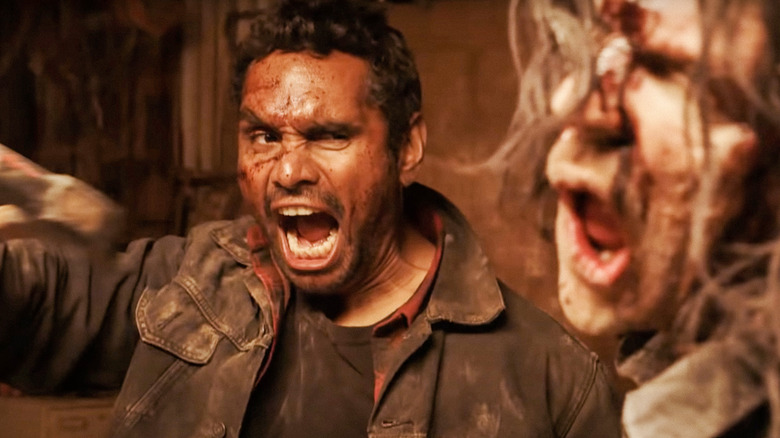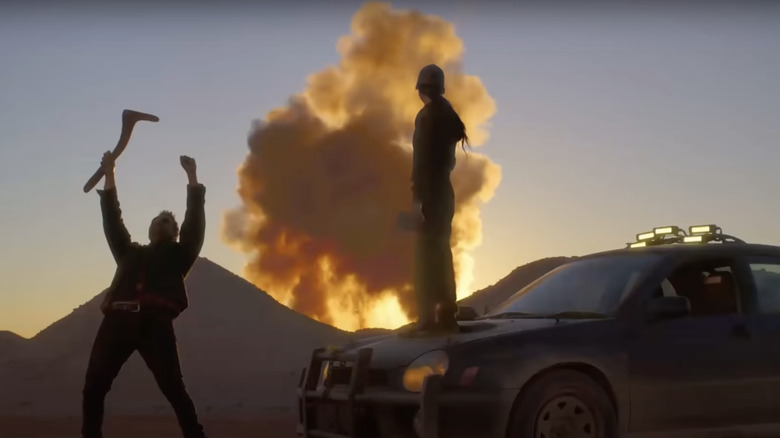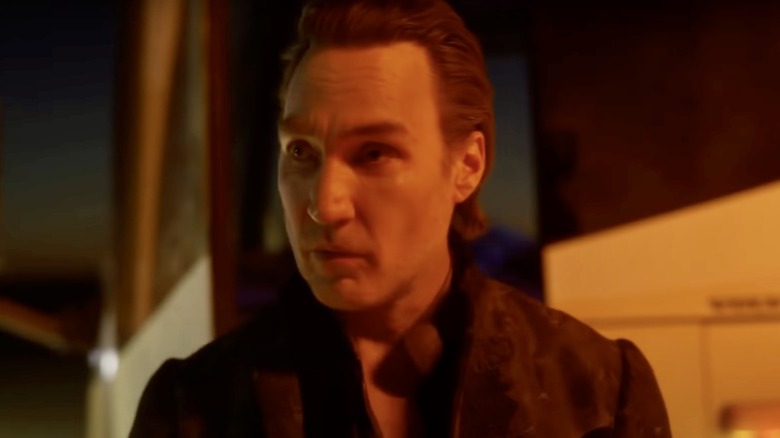The Daily Stream: Meet The Australian Bloodhunters Of Firebite
(Welcome to The Daily Stream, an ongoing series in which the /Film team shares what they've been watching, why it's worth checking out, and where you can stream it.)
The Series: "Firebite"
Where You Can Watch It: AMC+
The Pitch: Indigenous "bloodhunters" kill vampires with boomerangs in abandoned mine shafts in the Australian desert. Are you sold yet, or are you (un)dead inside?
"Firebite" is one of those shows that came and went without much buzz as the Internet's focus was scattered across a million streaming platforms. It's as if we've all become lost down a vast network of opal mine holes in the desert, much like the vampire victims in "Firebite." There are nonconsensual blood donors and chambers of human skulls down in those holes, and if you squint hard enough, maybe you'll see your own face.
We're all going to die, except the vampires, and would you really want to be one of them? After all, as "Firebite" teaches, they're the ones who brought smallpox to Australia and infected the Aboriginal population with it.
Created by Warwick Thornton and Brendan Fletcher "Firebite" commenced its eight-episode first season in mid-December and capped it in early February, just in time for Black History Month. The show first came to my attention last summer when we reported that Yael Stone and Callan Mulvey had joined the cast. Unsurprisingly, given his penchant for playing HYDRA agents and such in well-known superhero films, Mulvey plays the Vampire King in "Firebite."
Speaking of superheroes, "Firebite" could be seen as a distant cousin to "Blade," which we spotlighted this month in our "Year of the Vampire" movie centennial. The real stars of this show are Rob Collins and Shantae Barnes-Cowan, who embody the bloodhunting duo of Tyson and Shanika.
Why it's essential viewing
"Firebite" has a unique sense of place, and it explores a fresh side of the vampire hunting mythos to the tune of some Aussie guitar rock. The vampires here nest underground in a honeycomb of tunnels outside an Australian mining town. The closest screen comparison might be the animated "Scooby-Doo and the Legend of the Vampire," but only because of the outback setting. In that movie, Dracula's howling "children of the night" are dingos instead of wolves. Shaggy asks, "Like, whoever heard of Australian vampires, anyway?"
"Firebite" is the swift, boomeranging answer to that question. It's easy to forget this, but AMC originally stood for "American Movie Classics." It's been said that Black history is American history ... but in "Firebite," it goes beyond borders and the African-American tradition to the realm of Australian history.
This series foregrounds the Indigenous perspective. Right from the beginning, it has Shanika giving a presentation in class about "the true history of Australia," where British colonialists came bearing smallpox and vampires, "addicted to the Blackfella blood." This isn't just a lazy expository scene; she's got 11 vampires in place of the 11 ships in the First Fleet, which established the foundational European penal colony Down Under.
Like the fortified Subaru WRX that kicks up off-road dust in it, "Firebite" has a few twists and turns that demonstrate it's not afraid to go where you don't expect, even striking a note of tragedy amid its cheesy, slow-mo, vampire-killing freeze frames. At times, the rhythms of it do make it feel a bit padded, like it could have been six episodes instead of eight. However, when I finished the last episode — and realized the season was over — I was sad to see it end and felt it had stuck the landing.
Firebite flips the script on the othering history of vampires
"Firebite" is a show that wears its heart on its sleeve and it doesn't need anyone coming at it with a wooden stake. If you're a music-lover, it might hit you where you live with the universal language as it puts the gleefully unhinged Tyson up on stage and has him give a sing-along bar rendition of the Coloured Stone song "Black Boy," which contains the line, "The color of the skin is your pride and joy."
Elsewhere, some of the social commentary in dialogue might feel rather on the nose in a "Candyman" 2021 kind of way. Statements like this aren't intended as negative appraisals, so much as an attempt to manage the viewer's expectations. "Firebite" isn't perfect (yes, I know, few movie or TV shows are), but if you make an honest effort to be receptive to its twist on the genre, it can be viewed as part of a counter-balance to the decades of Eurocentric, sometimes xenophobic stories — vampire-related and otherwise — that have dominated the screen.
When you compare the antisemitic caricature, for instance, on the cover of the 1908 dime novel "Jew Jokes" with the sidelong profile of Count Orlok and Knock in the 1922 German film "Nosferatu," it's impossible to unsee that image or un-ring that bell. We've seen movies like that, where Jewish-coded vampires bring the plague to parts of the Old World, just as we've seen the Hungarian O.G. Dracula, Bela Lugosi, cast as an Arab and Hindu in American pre-Code films where one all-purpose foreigner was as good as another.
"Firebite" tips the scales the other way by pitting its Indigenous bloodhunters against colonialist invaders. Pacing issues aside, I grew attached enough to the characters in this show that I could appreciate how their individual arcs paid off, and it did leave me with a lump in my throat and that Coloured Stone song in my head.


